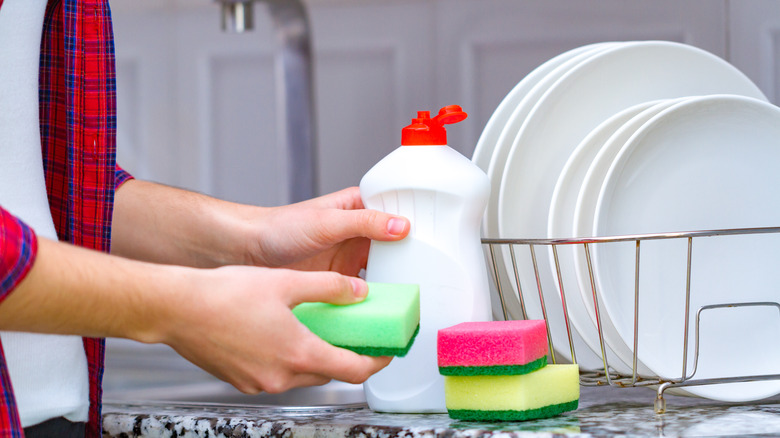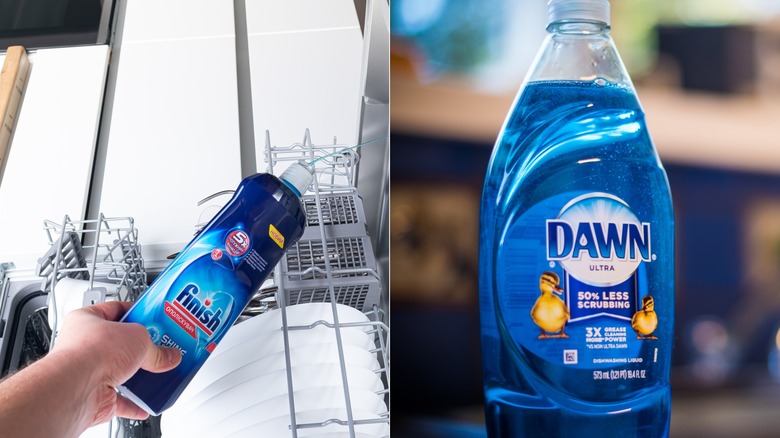Hand-Washing Dishes With Dishwasher Detergent: Good Or Bad Idea?
While it's common knowledge that putting dish soap in your dishwasher is a bad idea, you might be wondering if you can substitute dishwasher detergent for hand-washing dishes. This may seem harmless and like a good way to get your dishes clean in a pinch, but it likely won't work well and could even be harmful. Regular dishwashing soap becomes sudsy, which is how it scrubs the grease and food off your plates and flatware. On the other hand, dishwashing detergent is made to clean without getting sudsy. Using this detergent to clean dishes in the sink could prove difficult, and you'll waste a lot of it trying to get the job done.
Additionally, dishwasher detergent contains more chemicals, including bleach, and has a higher pH level, making it partially corrosive. These harsh ingredients are not made to be touched, and they could damage your skin. The National Capital Poison Center warns that coming into direct contact with dishwasher detergent can irritate your skin and eyes or even cause chemical burns. To ensure your dishes are getting properly cleaned, avoid wasting detergent, and keep yourself safe, don't use detergent instead of dish soap.
Why detergent isn't a good choice for hand-washing dishes
While both dish soap and dishwashing detergent contain surfactants to clean your dishes, they are different varieties for different purposes. Allen Clauss, a chemistry lecturer at the University of Wisconsin-Madison and a former employee at Procter and Gamble, explained to the university's newspaper how surfactants help clean. "Surfactants are active ingredients we put in cleaning products that bridge the gap between water and greasy dirt and help wash it away," Clauss said.
The surfactants in dishwasher detergent are made to endure extremely hot water and high water pressures, which could make it difficult to rinse off in the sink. This could leave you with detergent residue stuck to your dishes, especially if you use an abundance of it to compensate for the lack of suds. This not only wastes your detergent, but you'll end up using more water to rinse your dishes, making this a pricey swap that isn't very effective.
How swapping dishwasher detergent for dish soap can be harmful
While dishwashing detergents have harsh surfactants, the ones used to make dish soap are formulated to be less abrasive and safer to touch. Additionally, the high pH levels and bleach that these detergents contain could wreak havoc on your hands. Typical dish soaps have a lower pH that is close to neutral. As Allen Clauss told the University of Wisconsin-Madison's newspaper, "It's a great way to clean your dishes, but it's not something you want to put your hands into." Since dishwasher detergents are designed to be used in an automated machine, the ingredients are more powerful and therefore not suitable to be handled. You could wear gloves while hand-washing your dishes, but the dishwasher detergent might still get onto your skin.
Reactions to touching dishwasher detergent or accidentally splashing it in your eye can range from mild to severe. According to the National Capital Poison Center, "If an ADD [automated dishwasher detergent] touches the eye, it can cause discomfort and pain, redness, tearing, and sometimes a scratch or burn on the surface of the eye. If left on the skin for a prolonged time, ADDs can cause skin burns of varying degrees resulting in redness and pain, peeling, and blistering." When hand-washing dishes, it's best not to substitute dishwasher detergent for dish soap to avoid handling harsh detergents.


